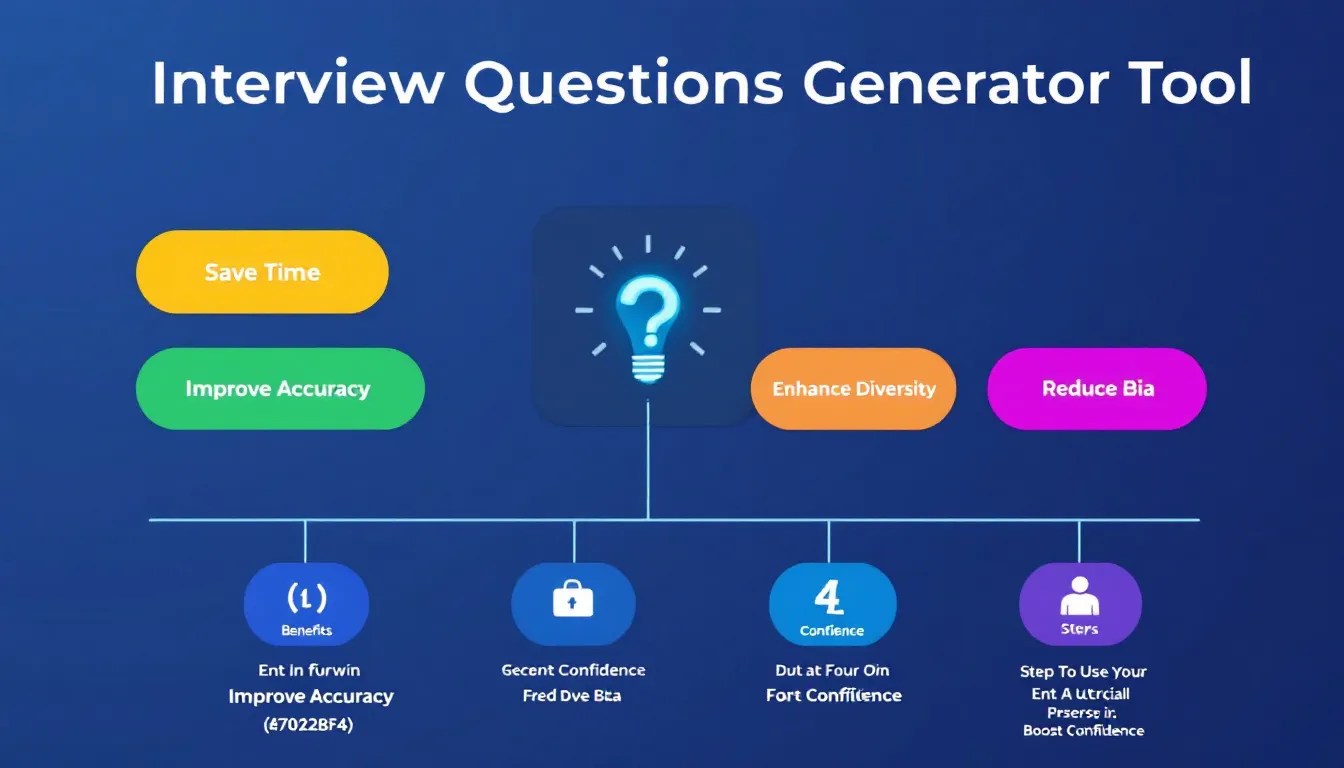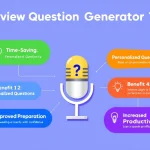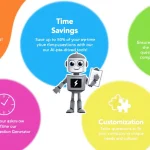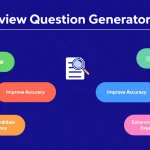Is this tool helpful?
How to Use the Interview Questions Generator Tool Effectively
This tool helps you create tailored behavioral interview questions that match any job role. Follow these simple steps to get the best results:
- Enter the Job Title: Type the exact job title for the role you’re hiring. For example, you might enter “Data Analyst” or “Customer Success Specialist.”
- Specify the Company Industry (Optional): Add the company’s industry to make questions more relevant. Examples include “Financial Services” or “Education.”
- List Key Skills (Optional): Include important skills or competencies tied to the role. For instance, you could enter “Critical Thinking, Conflict Resolution, Time Management.”
- Generate Interview Questions: Click the button to instantly receive a customized list of behavioral questions for your candidate interviews.
- Review and Use: Look over the generated questions and use them to guide your interviews. You can copy them to easily add to your hiring documents.
About the Behavioral Interview Questions Generator Tool
This tool creates customized behavioral interview questions based on the job title, company industry, and key skills you provide. It helps hiring managers and HR professionals quickly prepare relevant questions that focus on a candidate’s past experiences and skills.
Behavioral interview questions reveal how candidates acted in specific work situations, offering insights into their problem-solving abilities, teamwork, leadership, and adaptability. Using this tool saves time and improves the quality of your interview process.
Key Benefits of Using the Tool
- Save Time: Generate tailored questions in seconds instead of spending hours writing them.
- Maintain Consistency: Ask standardized questions for each candidate applying to the same role.
- Customize by Industry and Skills: Get questions that match your company’s sector and the role’s required competencies.
- Assess a Range of Competencies: Cover technical skills, leadership, communication, and problem-solving.
- Make Informed Hiring Decisions: Focus on concrete examples from candidates’ past work to predict future performance.
Practical Uses: How to Apply This Tool in Hiring
This generator fits into many parts of the hiring process, including:
Creating Interview Guides
Use the tool to build structured interview guides that ensure you cover all necessary competencies in behavioral questions tailored to each role. For example, if you’re interviewing for a “Digital Marketing Specialist” position in the “Nonprofit” sector, generate questions that focus on both marketing skills and nonprofit challenges.
Preparing Screening Calls
Select relevant questions generated by the tool for phone or video screenings to assess key skills early in the process.
Supporting Internal Promotions
When promoting employees, use the tool to design questions that evaluate leadership, adaptability, and growth in alignment with their new responsibilities.
Example Scenario: Hiring a Product Manager in E-commerce
- “Tell me about a time you prioritized competing product features—how did you decide, and what was the result?”
- “Describe a situation where you had to coordinate between development and marketing teams. What challenges arose, and how did you handle them?”
- “Can you share an example of leading a product launch? What obstacles did you face, and how did you overcome them?”
Using these questions helps interviewers evaluate project management skills, cross-functional communication, and leadership in a relevant context.
Understanding Behavioral Interview Questions
Behavioral questions focus on past experiences to predict future job performance. They encourage candidates to describe real situations where they demonstrated skills needed for the job.
The STAR Method Framework
Encourage candidates to answer using the STAR technique, which covers:
- Situation: Explain the context of the experience.
- Task: Describe the challenge or responsibility.
- Action: Detail the steps taken to address the challenge.
- Result: Share the outcome and impact of the actions.
This method helps you gather clear and detailed answers to evaluate skills effectively.
Frequently Asked Questions About the Interview Questions Generator
How many questions does the tool create?
Typically, you’ll receive 10-15 questions tailored to the job title, industry, and skills you provide, covering various competencies and scenarios.
Can I adjust or customize the questions?
Yes, the generated questions serve as a foundation you can tailor to match your company culture or specific interview needs.
Are these questions suitable for different experience levels?
The questions adapt to entry-level and senior roles, but you can modify the complexity based on the candidate’s experience.
How often should I refresh my questions?
Regularly update your question set to prevent candidates from preparing rehearsed answers. Refresh questions for each hiring cycle or every few months.
Can I use this tool for internal hires and promotions?
Absolutely. The tool can help assess readiness for new roles by generating questions focused on growth and leadership potential.
Are the questions legally compliant and appropriate?
The tool generates professional, job-focused questions. Always review generated content to ensure compliance with employment laws and company policies.
Important Disclaimer
The calculations, results, and content provided by our tools are not guaranteed to be accurate, complete, or reliable. Users are responsible for verifying and interpreting the results. Our content and tools may contain errors, biases, or inconsistencies. Do not enter personal data, sensitive information, or personally identifiable information in our web forms or tools. Such data entry violates our terms of service and may result in unauthorized disclosure to third parties. We reserve the right to save inputs and outputs from our tools for the purposes of error debugging, bias identification, and performance improvement. External companies providing AI models used in our tools may also save and process data in accordance with their own policies. By using our tools, you consent to this data collection and processing. We reserve the right to limit the usage of our tools based on current usability factors.







